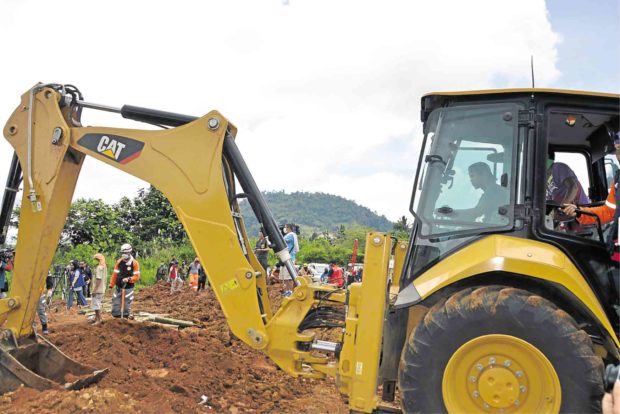Backhoe operator: Digging graves for Marawi dead ‘kind of eerie’

Jelbin Darantinao, an employee of the provincial government of Lanao del Sur, operates a backhoe to dig graves for casualties in Marawi City. —DIVINA M. SUSON
MARAWI CITY—Jelbin Darantinao maneuvers the backhoe into position on a site marked for digging—not for canals or road projects that he had been doing for 12 years for the Lanao del Sur provincial government, but for the remains of the dead in the ongoing war in Marawi City.
Darantinao had gotten used to operating the backhoe, owned by the provincial government, to dig holes for road works. He hadn’t used his skill in operating the machine to dig holes for dead human bodies.
That was until Marawi, a predominantly Muslim city, was torn by terror and the war unleashed by the government to pluck it out.
“It’s kind of eerie because I’m burying a group of persons I don’t know,” said Darantinao, an employee of the provincial government since 2005.
In the last four months, Darantinao has been digging burial holes for bodies and skeletal remains retrieved from the war zone.
Article continues after this advertisementConversation with souls
Article continues after this advertisement“I am a Christian and I believe that we have a soul,” he said.
“So I silently talk to them while operating the backhoe,” he added, “them” referring to souls of the dead.
He said he had told the mostly Muslim dead “I am only doing my job, I’m just following orders, please don’t scare me.”
Darantinao helped dig the mass grave for the 40 sets of human remains buried at Maqbara Public Cemetery in the village of Papandayan Caniogan on Thursday.
It was the third mass burial of casualties in the war—civilians and terrorists—since the war started on May 23.
On July 24, Darantinao also dug burial holes for 27 sets of human bones and for 27 others on Sept. 5.
The remains were those of casualties retrieved by the crisis committee team from areas where government forces continued to operate against Islamic State gunmen belonging to two homegrown terror groups—Maute and Abu Sayyaf.
The war had gone on for at least two months.
Clearing operations
After the military announced that the war was about to end, Darantinao said he also received an office memo saying he would be among those to be called to work on clearing operations in the main battle area, where structures had been reduced to rubble.
Until then, Darantinao said he expected to see more bodies and skeletal remains and to dig more holes for these.
His worst fear, however, was not of being visited by the ghosts of those who were buried in the holes he dug. His worst fear, he said, was hitting an unexploded bomb and getting blown to bits.
“I only wish that everything will be totally cleared from bombs when the military allows us to get inside and start our work,” he said.
“To be hit by bombs is my greatest fear because I have a family waiting for me to come home,” he said. —DIVINA M. SUSON